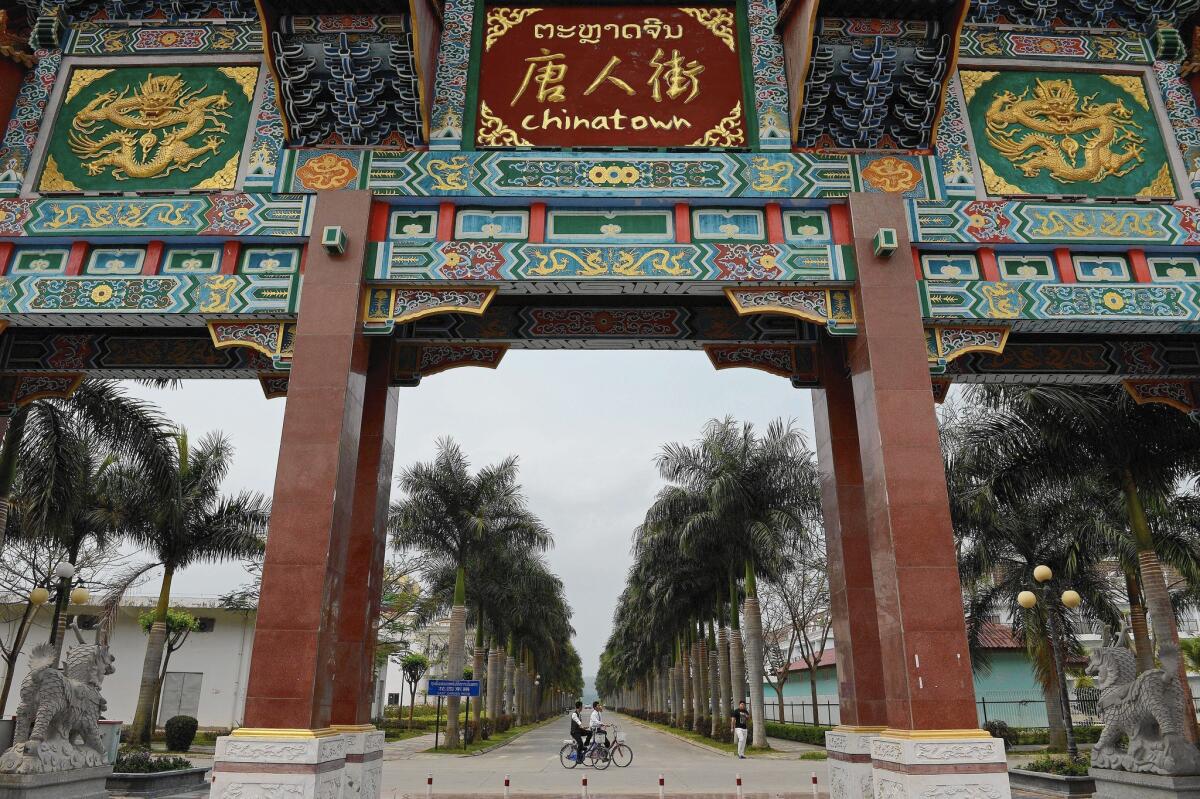In Laos’ economic zone, a casino and illicit trade beckon in ‘lawless playground’

- Share via
Reporting from TON PHEUNG, Laos — The Kings Romans Casino is an island of extravagance in the Laotian jungle, its corrugated green domes arching high above the treetops.
Inside, hundreds of stone-faced gamblers hunch over baccarat tables, betting thousands of dollars a hand in heavy silence. Out back, a parking lot full of Rolls-Royce limousines adjoins dusty construction yards and banana plantations, with high, forested peaks beyond.
“What do you come for?” a Kings Romans chauffeur said as he shuttled a visitor from the casino to a nearby tourist market. “You like to gamble? You like girls? You can find all sorts of girls here: Chinese, Burmese, Lao, Thai. Here, you can get whatever you want, as long as you have the money.”
Kings Romans is the centerpiece of the Golden Triangle Special Economic Zone, a 39-square-mile private concession in northwestern Laos, an impoverished communist country of 6.7 million between Thailand and Vietnam. As the name suggests, it is within the Golden Triangle, the area where Thailand, Laos and Myanmar meet and which is known for opium cultivation and drug smuggling.
In 2007, the Laotian government gave the Hong Kong-based company Kings Romans Group a 99-year land lease, and Kings Romans, in return, promised to turn the area around. In a 15-minute promotional video uploaded to Chinese video-sharing websites in 2013, the company boasted of a forthcoming “integrated trade and tourism zone” replete with luxury resorts, spas, a golf course, a yacht club and helicopter tours.
Yet critics say the zone has instead become a mecca of gambling, prostitution and illicit trade, raising questions about the spillover effects of China’s growing economic clout beyond its borders. The terms of the lease remain unclear.
“It was worth it to the [Lao People’s Revolutionary] party — or at least to some people in the party — to allow what seemed like almost a violation of its sovereignty, in order to recoup money from it,” said Joshua Kurlantzick of the Council on Foreign Relations, an expert on Chinese-Southeast Asian ties.
“If you’re asking whether Lao people are concerned about the general relationship with China … people are,” he continued. “But are we going to see a big debate about that? No, because Laos is extremely opaque, and it’s up there, along with North Korea, as one of the most repressive states in the world.”
Chinese gamblers, legally barred from betting in their home country, account for most of the region’s visitors. Many fly from southern China’s Yunnan province to northern Thailand, travel to the Laotian border by bus and arrive at the casino via a short cross-river boat ride. Businesses accept Chinese currency and restaurants serve Chinese fare. Clocks are set to Beijing time, an hour ahead of the rest of Laos.
The Golden Triangle Special Economic Zone is not unique. Chinese casinos, several of them owned by Kings Romans Group, have sprung up in other remote pockets of Southeast Asia, such as Mong La, a lawless town in Myanmar’s rebel-held northeast.
Beijing has not publicly supported the projects, nor has it taken clear steps to shut them down.
The Kings Romans casino is a picture of decadent excess: Ersatz Renaissance frescoes adorn the ceilings; a gold-plated statue of a hulking Zeus-like figure sits atop the marble atrium stairs. In nearby “Chinatown,” a small pedestrian street flanked by small souvenir shops and restaurants, women in short skirts advertise “untraditional massages.”
Most of the zone’s 4,500 workers are Chinese.
“Everybody here heard about this place through friends,” said a tall, blond Ukrainian woman who worked at the casino’s reception desk and spoke on condition of anonymity, saying she was not authorized to speak on behalf of the company.
Most come from southwestern China and overseas Chinese communities in Thailand and Myanmar, she said. They live in on-site dormitories and earn about $800 to $1,600 a month, about as much as a construction worker in mainland China.
About 30 Ukrainians live in the zone, many of whom left their country because of the conflict there, she said. Most work as card dealers. She arrived last year, after a middle-aged man promised her a lucrative job at a real estate venture. The man soon fled for mysterious reasons, and she found a job at the casino.
This spring, a report by the London-based Environmental Investigation Agency called the area a “lawless playground” where tourists can buy banned wildlife products: tiger bone wine, pangolin scales, bear paws, python meat. One restaurant offered “sauteed tiger meat” and kept a complete skeleton of a large cat in a wine-filled tank, the report says.
Laos is a signatory to the Convention on International Trade in Endangered Species, making such trade illegal within its borders.
On March 31, Lao National Television reported that police raided businesses in the zone after the report was released and found illegal items in four “foreign-owned restaurants.” They destroyed a pile of confiscated tiger pelts, bear feet and elephant ivory worth more than $12,000. Since then, the restaurants appear to have closed.
“This was a sign that the government does respond to external pressure, even if it’s just a cosmetic response,” said Debbie Banks, a senior campaigner at the environmental organization. “But our priority is to prompt Chinese investigations into the company itself.”
The Kings Romans Group is led by Chief Executive Zhao Wei, 64, a onetime village doctor from Heilongjiang province in China’s far northeast. In 2011, Zhao told the state broadcaster CCTV that he decided to become a businessman after befriending a man on a train who worked in the lumber business. His path into the gaming industry remains unclear.
“The Laotian government gives us the sky,” he told the broadcaster. “In return, we will build a beautiful city in gratitude to the Lao people.”
Representatives of Kings Romans Group declined multiple interview requests.
Brian Eyler, an expert on China-Southeast Asia relations at the Stimson Center in Washington who has visited the Golden Triangle Special Economic Zone several times, said that the company’s use of land has created problems for local laborers.
Much of the zone is covered with banana plantations, and the bananas grown there “are not your typical Lao variety; they’re the ones you find in supermarkets in Beijing,” he said. “They’re grown with lots of fertilizer, lots of pesticides.... We’ve heard of many people getting sick from exposure to pesticides.”
Yet many of the zone’s Chinese workers appear perfectly at home. At a small restaurant on the Mekong’s banks across from the casino, an ethnic Chinese woman from Kachin state in Myanmar, also known as Burma, sat chopping vegetables.
Like many other workers in the zone, she refused to give her name, wary of foreign journalists. But she said she moved to the zone two years ago to escape ethnic conflict at home. She serves several tourists a day, she said, most of them weary from gambling.
“There are opportunities here,” she added. “Everything here is OK.”
Harvard Zhang of The Times’ Beijing bureau contributed to this report.
More to Read
Sign up for Essential California
The most important California stories and recommendations in your inbox every morning.
You may occasionally receive promotional content from the Los Angeles Times.













